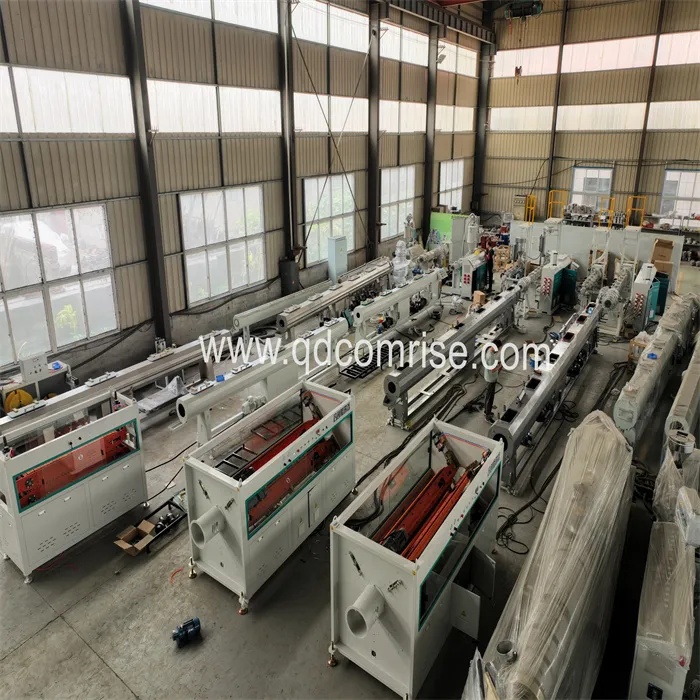A Guide to Choosing the Right HDPE Pipe Machine for Your Business
2024-09-02
Introduction
For manufacturers in the piping industry, investing in the right equipment is critical to ensuring efficient production and high-quality products. HDPE (High-Density Polyethylene) pipe machines are essential for producing durable and versatile pipes used in various applications. However, with a wide range of machines available on the market, choosing the right HDPE pipe machine for your business can be challenging. This blog post will guide you through the key factors to consider when selecting an HDPE pipe machine to meet your production needs.

1. Determine Your Production Requirements
Before investing in an HDPE pipe machine, it is essential to understand your production requirements. Consider the following questions:
- What is the expected production volume?
Determine how many meters of pipe you need to produce daily or monthly. This will help you choose a machine with the appropriate production capacity.
- What pipe sizes do you need to produce?
HDPE pipes come in various diameters and thicknesses. Identify the specific sizes you need to manufacture to ensure the machine you choose can handle those specifications.
- What is the application of the pipes?
Different applications may require different pipe characteristics, such as flexibility, pressure rating, or chemical resistance. Understanding the end-use of the pipes will help you select a machine that can produce pipes with the necessary properties.
2. Evaluate the Machine's Extrusion Capacity
The extrusion capacity of an HDPE pipe machine is a critical factor to consider. This capacity determines how much HDPE material can be processed and extruded into pipes within a given time frame. Machines with higher extrusion capacities are suitable for large-scale production, while smaller capacities are ideal for businesses with lower production needs.
- Screw Diameter and Length: The screw's diameter and length in the extruder affect the extrusion capacity. Larger screws can handle more material, increasing the machine's output.
- Motor Power: The motor's power determines the speed and efficiency of the extrusion process. Higher motor power allows for faster production, which is essential for meeting high-volume demands.
3. Consider the Quality of the Machine's Components
The quality of the components used in an HDPE pipe machine directly impacts the durability and performance of the machine. Key components to evaluate include:
- Extruder Screw and Barrel: High-quality screws and barrels are essential for consistent melting and mixing of HDPE material. Look for machines with wear-resistant screws and barrels to ensure longevity and efficient production.
- Die Head Design: The die head shapes the pipe and influences its dimensions and wall thickness. A well-designed die head ensures precise and consistent pipe production.
- Cooling and Calibration System: Effective cooling and calibration systems are crucial for maintaining the pipe's shape and quality. Machines with advanced cooling and calibration features produce pipes with smooth surfaces and accurate dimensions.
4. Assess Automation and Control Features
Modern HDPE pipe machines are equipped with automation and control features that enhance production efficiency and product quality. Consider the following features:
- PLC Control System: A Programmable Logic Controller (PLC) system allows for precise control of the extrusion process, including temperature, speed, and pressure. This ensures consistent production and reduces the risk of defects.
- Touch Screen Interface: A user-friendly touch screen interface simplifies machine operation and allows operators to monitor and adjust production parameters easily.
- Automated Haul-Off and Cutting Units: Automated haul-off and cutting units streamline the production process, reducing manual labor and ensuring uniform pipe lengths.
5. Evaluate Energy Efficiency
Energy efficiency is an important consideration for reducing production costs and minimizing environmental impact. Look for HDPE pipe machines with energy-efficient components and features, such as:
- Energy-Saving Motors: Machines with energy-saving motors consume less electricity, reducing operational costs.
- Efficient Heating Systems: Advanced heating systems ensure optimal temperature control, reducing energy consumption during the extrusion process.
6. Consider the Manufacturer's Reputation and Support
Choosing a reputable manufacturer is essential for ensuring the quality and reliability of your HDPE pipe machine. Research manufacturers' track records, customer reviews, and industry experience. Additionally, consider the availability of technical support, spare parts, and training services. A reliable manufacturer will provide comprehensive support to ensure your machine operates efficiently and meets your production needs.
Conclusion
Investing in the right HDPE pipe machine is crucial for the success of your piping business. By carefully considering your production requirements, machine capacity, component quality, automation features, energy efficiency, and the manufacturer's reputation, you can select a machine that meets your needs and delivers high-quality pipes consistently. With the right HDPE pipe machine, you can enhance your production capabilities and meet the growing demand for durable and versatile piping solutions.


